כאָטש הימלען בלײַענע פֿאַרשטעלן בלאָע טעג ;
ווײַל קומען וועט נאָך אונדזער אויסגעבענקטע שעה –
עס וועט אַ פּויק טאָן אונדזער טראָט – מיר זײַנען דאָ!
ווײַל קומען וועט נאָך אונדזער אויסגעבענקטע שעה –
עס וועט אַ פּויק טאָן אונדזער טראָט – מיר זײַנען דאָ!
פֿון גרינעם פּאַלמען־לאַנד ביז לאַנד פֿון ווייַטן שניי,
מיר קומען אָן מיט אונדזער פּײַן, מיט אונדזער וויי.
און וווּ געפֿאַלן ס'איז אַ שפּריץ פֿון אונדזער בלוט,
ס'וועט אַ שפּראָץ דאָרט אונדזער גבֿורה אונדזער מוט.
און וווּ געפֿאַלן ס'איז אַ שפּריץ פֿון אונדזער בלוט,
ס'וועט אַ שפּראָץ דאָרט אונדזער גבֿורה אונדזער מוט.
ס´וועט די מאָרגן-זון באַגילדן אונדז דעם הײַנט,
און דער נעכטן וועט פֿאַרשווינדן מיטן פֿײַנט,
און אויב פֿאַרזאַמען וועט די זון אין דעם קאַיאָר –
ווי אַ פּאַראָל זאָל גיין דאָס ליד פֿון דור צו דור.
און אויב פֿאַרזאַמען וועט די זון אין דעם קאַיאָר –
ווי אַ פּאַראָל זאָל גיין דאָס ליד פֿון דור צו דור.
דאָס ליד געשריבן איז מיט בלוט און ניט מיט בלײַ,
ס´איז ניט קיין ליד פֿון אַ פֿויגל אויף דער פֿרײַ.
דאָס האָט אַ פֿאָלק צווישן פֿאַלנדיקע ווענט,
דאָס ליד געזונגען מיט נאַגאַנעס אין די הענט.
דאָס האָט אַ פֿאָלק צווישן פֿאַלנדיקע ווענט,
דאָס ליד געזונגען מיט נאַגאַנעס אין די הענט.
טאָ זאָג ניט קיינמאָל אַז דו גייסט דעם לעצטן וועג,
כאָטש הימלען בלײַענע פֿאַרשטעלן בלאָע טעג.
ווײַל קומען וועט נאָך אונדזער אויסגעבענקטע שעה –
עס וועט אַ פּויק טאָן אונדזער טראָט – מיר זײַנען דאָ!
ווײַל קומען וועט נאָך אונדזער אויסגעבענקטע שעה –
עס וועט אַ פּויק טאָן אונדזער טראָט – מיר זײַנען דאָ!

Contributed by Riccardo Venturi - -0001/11/30 - 00:00
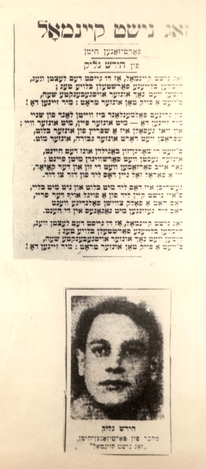
Zog nit keynmol az du geyst dem letstn veg,
Khotsh himeln blayene farshteln bloye teg.
Kumen vet nokh undzer oysgebenkte sho -
S'vet a poyk ton undzer trot - mir zaynen do!
Kumen vet nokh undzer oysgebenkte sho -
S'vet a poyk ton undzer trot - mir zaynen do!
Fun grinem palmen-land biz vaysn land fun shney,
Mir kumen on mit undzer payn, mit undzer vey,
Un vu gefain s'iz a shprits fun undzer blut,
Shprotsn vet dort undzer gvure, undzer mut.
Un vu gefain s'iz a shprits fun undzer blut,
Shprotsn vet dort undzer gvure, undzer mut.
S'vet di morgnzun bagildn undz dem haynt,
Un der nekhtn vet farshvindn mitn faynd,
Nor oyb farzamen vet di zun in dem kayor -
Vi a parol zol geyn dos lid fun dor tsu dor.
Nor oyb farzamen vet di zun in dem kayor -
Vi a parol zol geyn dos lid fun dor tsu dor.
Dos lid geshribn iz mit blut un nit mit blay,
S'iz not keyn lidl fun a foygl af der fray,
Dos hot a fold tsvishn faindike vent
Dos lid gezungen mit naganes in di hent!
Dos hot a fold tsvishn faindike vent
Dos lid gezungen mit naganes in di hent!
To zog nit keynmol az du geyst dem letstn veg,
Khotsh kimlen blayene farshteln bloye teg,
Kumen vet nokh undzer oysgebenkte sho -
S'vet a poyk ton undzer trot - mir zaynen do!
Kumen vet nokh undzer oysgebenkte sho -
S'vet a poyk ton undzer trot - mir zaynen do!
Hebrew version by Avraham Shlonsky [1945], reproduced from La Chambre Claire
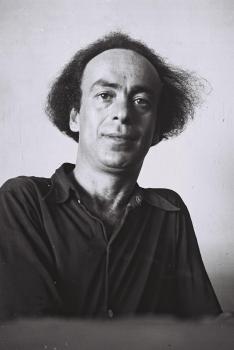
A sua volta reintegrata con la versione puntata (tiberiense) ripresa da zemershet.il
Then merged with the punctuated (Tiberian) version taken from zemershet.il
מילים: הירש גליק
תרגום/נוסח עברי: אברהם שלונסקי
לחן: דמיטרי פוקראס , דניאיל פוקראס
שנת כתיבה: יידיש: 1943 עברית: 1945
שנת הלחנה: 1937
אַל נָא תֹּאמַר: הִנֵּה דַּרְכִּי הָאַחֲרוֹנָה,
אֶת אוֹר הַיּוֹם הִסְתִּירוּ שְׁמֵי הָעֲנָנָה.
זֶה יוֹם נִכְסַפְנוּ לוֹ עוֹד יַעַל וְיָבוֹא,
וּמִצְעָדֵנוּ עוֹד יַרְעִים: אֲנַחְנוּ פֹּה!
זֶה יוֹם נִכְסַפְנוּ לוֹ עוֹד יַעַל וְיָבוֹא,
וּמִצְעָדֵנוּ עוֹד יַרְעִים: אֲנַחְנוּ פֹּה!
מֵאֶרֶץ הַתָּמָר עַד יַרְכְּתֵי כְּפוֹרִים
אֲנַחְנוּ פֹּה בְּמַכְאוֹבוֹת וְיִסּוּרִים
וּבַאֲשֶׁר טִפַּת דָּמֵנוּ שָׁם נִגְּרָה
הֲלֹא יָנוּב עוֹד עֹז רוּחֵנוּ בִּגְבוּרָה.
וּבַאֲשֶׁר טִפַּת דָּמֵנוּ שָׁם נִגְּרָה
הֲלֹא יָנוּב עוֹד עֹז רוּחֵנוּ בִּגְבוּרָה.
עַמּוּד הַשַּׁחַר עַל יוֹמֵנוּ אוֹר יָהֵל.
עִם הַצּוֹרֵר יַחֲלֹף תְּמוֹלֵנוּ כְּמוֹ צֵל.
אַךְ אִם חָלִילָה יְאַחֵר לָבוֹא הָאוֹר
כְּמוֹ סִיסְמָה יְהֵא הַשִּׁיר מִדּוֹר לְדוֹר.
אַךְ אִם חָלִילָה יְאַחֵר לָבוֹא הָאוֹר
כְּמוֹ סִיסְמָה יְהֵא הַשִּׁיר מִדּוֹר לְדוֹר.
אַךְ אִם חָלִילָה יְאַחֵר לָבוֹא הָאוֹר
כְּמוֹ סִיסְמָה יְהֵא הַשִּׁיר מִדּוֹר לְדוֹר.
בִּכְתַב הַדָּם וְהָעוֹפֶרֶת הוּא נִכְתַּב;
הוּא לֹא שִׁירַת צִפּוֹר הַדְּרוֹר וְהַמֶּרְחָב,
כִּי בֵּין קִירוֹת נוֹפְלִים שָׁרוּהוּ כָּל הָעָם,
יַחְדָּיו שָׁרוּהוּ וְנאַגאַנִים בְּיָדָם.
עַל כֵּן אַל נָא תֹּאמַר: דַּרְכִּי הָאַחֲרוֹנָה
אֶת אוֹר הַיּוֹם הִסְתִּירוּ שְׁמֵי הָעֲנָנָה.
זֶה יוֹם נִכְסַפְנוּ לוֹ עוֹד יַעַל וְיָבוֹא,
וּמִצְעָדֵנוּ עוֹד יַרְעִים: אֲנַחְנוּ פֹּה!
זֶה יוֹם נִכְסַפְנוּ לוֹ עוֹד יַעַל וְיָבוֹא,
וּמִצְעָדֵנוּ עוֹד יַרְעִים: אֲנַחְנוּ פֹּה!
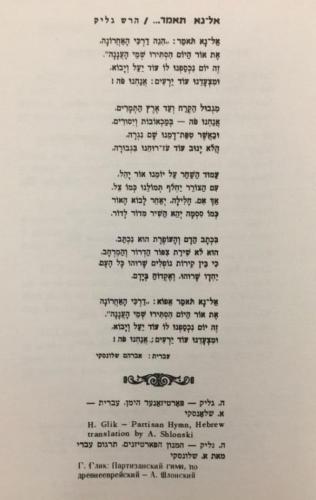
Contributed by Riccardo Venturi - 2005/6/28 - 15:13
(Da Riccardo Venturi, 11-3-2017 06:25)
Il titolo ebraico è propriamente "Canto dei partigiani". Nella versione riportata nel video la seconda strofa non è cantata. Tra gli adattamenti testuali è da segnalare particolarmente, rispetto all'originale, che il "canto scritto col sangue, non con la matita" diviene qua un "canto scritto con scrittura di sangue e piombo": sembra già una visione decisamente "israeliana". Variazione meno importante è il "canto su un uccello in libertà", che diviene un "canto su un uccello, sulla libertà e sull'orizzonte". Avraham Shlonsky (ucraino di nascita) era militante del MAPAM ("Partito Unificato dei Lavoratori"), di ispirazione marxista ma sionista. [RV]
Al na tomàr: inè darkì haakhronà,
et or hayòm histìru shmey ha'annanà.
Ze yom nikhsàfnu lo 'od ya'al veyavò,
umits'adèynu 'od yor'ìm: anàkhnu po!
Ze yom nikhsàfnu lo 'od ya'al veyavò,
umits'adèynu 'od yor'ìm: anàkhnu po!
Meèrets hatamàr 'ad yarkatèy kforìm
anàkhnu po bemakhovòt veissorìm,
uveashèr tìpat damènu sham nigrà
halò yanùv 'od 'oz rukhènu begvurà.
Uveashèr tìpat damènu sham nigrà
halò yanùv 'od 'oz rukhènu begvurà.
Amùd hashàkhar 'al yomènu 'or yahèl,
'im hatsorèr yakhlòf tmolènu kmo tsel.
Am 'im halìla yàkher lavò ha'òr
kmo sìsma yèhe hashìr midòr ledòr.
Am 'im halìla yàkher lavò ha'òr
kmo sìsma yèhe hashìr midòr ledòr.
Bikhtàv hadàm veha'ofèret, hu nikhtàv.
Hu lo shiràt tsipòr hadròr vehamerkhàv,
ki ven kiròt noflìm sharùhu kol ha'àm
yakhdàv sharùhu venagànim beyadàm.
Ki ven kiròt noflìm sharùhu kol ha'àm
yakhdàv sharùhu venagànim beyadàm.
Al na tomàr: inè darkì haakhronà,
et or hayòm histìru shmey ha'annanà.
Ze yom nikhsàfnu lo 'od ya'al veyavò,
umits'adèynu 'od yor'ìm: anàkhnu po!
Ze yom nikhsàfnu lo 'od ya'al veyavò,
umits'adèynu 'od yor'ìm: anàkhnu po!
CANTO DEI PARTIGIANI
Non dire mai che questo è il tuo ultimo cammino,
anche se le nuvole bloccano la luce del giorno.
Questo è il giorno al quale aneliamo, sorgerà e verrà
e i nostri passi ancora risuoneranno: siamo qua!
Questo è il giorno al quale aneliamo, sorgerà e verrà
e i nostri passi ancora risuoneranno: siamo qua!
Dalla terra della palma alle gelide lontananze
noi siamo qua col nostro dolore, la nostra pena,
ovunque sia caduta una goccia di sangue,
da là emanerà il nostro coraggio e il nostro spirito.
Ovunque sia caduta una goccia di sangue,
da là emanerà il nostro coraggio e il nostro spirito.
Lo splendore dell'alba illuminerà il nostro giorno,
prenderà il posto dell'oppressore e dell'ieri, come l'ombra.
Ma se la notte tarderà a portare la luce,
allora questo canto sia un segnale per le generazioni a venire.
Ma se la notte tarderà a portare la luce,
allora questo canto sia un segnale per le generazioni a venire.
Con scrittura di sangue e piombo è stato scritto,
non è una canzone su un uccello, sulla libertà o sull'orizzonte.
Tra muri che crollano un popolo ha cantato questo canto,
lo ha cantato unito con le granate in mano.
Tra muri che crollano un popolo ha cantato questo canto,
lo ha cantato unito con le granate in mano.
Non dire mai che questo è il tuo ultimo cammino,
anche se le nuvole bloccano la luce del giorno.
Questo è il giorno al quale aneliamo, sorgerà e verrà
e i nostri passi ancora risuoneranno: siamo qua!
Questo è il giorno al quale aneliamo, sorgerà e verrà
e i nostri passi ancora risuoneranno: siamo qua!
Contributed by Riccardo Venturi - 2017/3/11 - 06:27
Non dire mai che hai percorso l'ultimo cammino
anche se le nuvole nascondono l'orizzonte
verrà ancora la nostra ora tanto attesa
risuonerà ancora il nostro passo "noi siamo qui"
verrà ancora la nostra ora tanto attesa
risuonerà ancora il nostro passo "noi siamo qui"
Dalle terre delle verdi palme alla terra delle bianche nevi
noi veniamo con il dolore delle nostre sofferenze
e dove è caduta una stilla del nostro sangue
lì fiorirà il nostro coraggio, il nostro eroismo
e dove è caduta una stilla del nostro sangue
lì fiorirà il nostro coraggio, il nostro eroismo
Il sole del mattino illuminerà d'oro il nostro oggi
e il nostro ieri si dissolverà con il nemico
ma anche se il sole e l'alba tardassero
come una parola d'ordine, questo canto andrà di generazione in generazione
ma anche se il sole e l'alba tardassero
come una parola d'ordine, questo canto andrà di generazione in generazione.
Questo canto è scritto con il sangue, non con l'inchiostro
non è un canto di un uccello in libertà
questo l'ha scritto un popolo fra muri che crollavano
l'ha cantato con i mitra in mano
questo l'ha scritto un popolo fra muri che crollavano
l'ha cantato con i mitra in mano
Non dire mai che hai percorso l'ultimo cammino
anche se le nuvole nascondono l'orizzonte
verrà ancora la nostra ora tanto attesa
risuonerà ancora il nostro passo "noi siamo qui"
verrà ancora la nostra ora tanto attesa
risuonerà ancora il nostro passo "noi siamo qui".
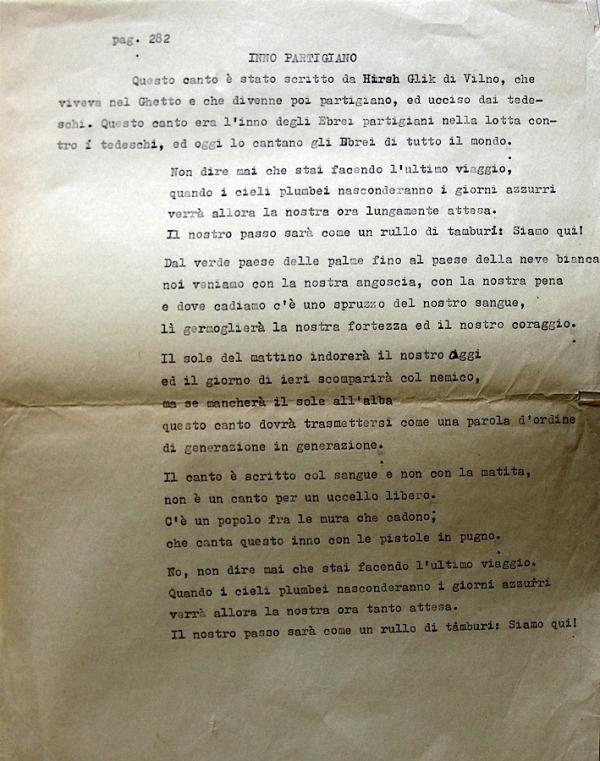
“Questo canto è stato scritto da Hirsh Glik di Vilno, che viveva nel Ghetto e che divenne poi inno partigiano, ed ucciso dai tedeschi. Questo canto era l'inno degli Ebrei partigiani nella lotta contro i tedeschi, ed oggi lo cantano gli Ebrei di tutto il mondo.”
Nota (11.3.2017) La traduzione italiana viene finalmente riportata anche dal punto di vista testuale, in modo da metterla a disposizione per l'uso. Da segnalare che è forse l'unica che intende realmente il celebre verso: "Scritto col sangue e non con la matita", generalmente tradotto (non solo in italiano) "...non col piombo". Blay in yiddish vale blayshtift (ted. "Bleistift") "matita, lapis". [RV]
Non dire mai che stai facendo l'ultimo viaggio,
quando i giorni plumbei nasconderanno i giorni azzurri
verrà allora la nostra ora lungamente attesa.
Il nostro passo sarà come un rullo di tamburi: Siamo qui!
Dal verde paese delle palme fino al paese della neve bianca
noi veniamo con la nostra angoscia, con la nostra pena
e dove cadiamo c'è uno spruzzo del nostro sangue,
lì germoglierà la nostra fortezza ed il nostro coraggio.
Il sole del mattino indorerà il nostro oggi,
ed il giorno di ieri scomparirà col nemico,
ma se mancherà il sole all'alba
questo canto dovrà trasmettersi come una parola d'ordine
di generazione in generazione.
Il canto è scritto col sangue e non con la matita,
non è un canto per un uccello libero.
C'è un popolo fra le mura che cadono,
che canta questo inno con le pistole in pugno.
No, non dire mai che stai facendo l'ultimo viaggio.
Quando i giorni plumbei nasconderanno i giorni azzurri
verrà allora la nostra ora lungamente attesa.
Il nostro passo sarà come un rullo di tamburi: Siamo qui!
Contributed by Bernart Bartleby - 2016/11/16 - 22:15
Rocco Rosignoli's performance of the song on the 2014 Day of Memory
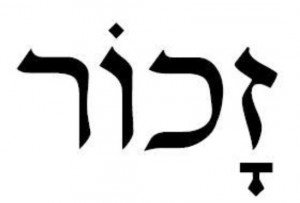
Il testo originale della canzone in yiddish è preceduto da un "testo concentrato" in italiano, recitato dall'autore. Grazie a Rocco per averci permesso di riprodurre questo testo e la canzone in preascolto.
The original Yiddish lyrics of the song are preceded by a short overview in Italian, recited by the author. Thanks to Rocco for allowing us to reproduce the lyrics and pre-download of the song [CCG/AWS Staff]
Affidandosi alle celebrazioni ufficiali, va a finire che del popolo ebraico si sa solo che ha subito un genocidio – e spesso la becera ignoranza fa sospettare i più malevoli che, se lo sterminio c’è stato, in fondo qualcosa per meritarselo gli ebrei l’abbiano fatto. Ed è falso. Altri negano, sminuiscono, obiettano, e perdono completamente di vista il nodo cruciale della faccenda, che non è la quantità di morti: è il fatto che un gruppo di uomini abbia adottato tecniche, strategie, macchinari propri dell’industria per uccidere su larga scala altri uomini, colpevoli non delle loro azioni ma del loro esistere.
A parer mio, la memoria non deve essere oggetto passivo di una celebrazione vuota, ma continua rielaborazione, sempre attiva, consapevole, mai pigra, di un patrimonio di conoscenze – e anche di un campionario di errori e orrori che non si possono negare, né sminuire, né sciacquar via con la lacrimuccia un giorno all’anno.
Per quella che è la mia esperienza, studiare la lingua ebraica, leggere i testi sacri (pur da fervente ateo), entrare per quel che si può nella cultura di un altro popolo, è ciò che mi ha avvicinato al mondo ebraico. Un dialogo tra culture, se è possibile, può nascere solo sulla base di una conoscenza reciproca. Una conoscenza che non ho mai trovato nei classici da prima serata del 27 gennaio, da Spielberg a Benigni.
Quello che io so fare è cantare. E allora alla causa di questa conoscenza reciproca offro un canto. Non è un canto di deportati, ma un canto di partigiani. Di uomini che nel ghetto di Vilna (in Lituania) rifiutarono di essere solo vittime, e resistettero al loro nemico. Che anche questo possa essere oggetto della memoria. Zakhor. - Rocco Rosignoli
Nemmeno quando tutto sembra perduto
Nemmeno quando l'ultima scintilla di speranza sembra svanire;
Non dire mai che il futuro è perduto,
Non dare un ultimo saluto,
La partenza è certa, il ritorno no,
Ma non dire mai che questo viaggio è l'ultimo
Perché dove cade una goccia del nostro sangue,
Lì, si parlerà di noi.
Contributed by CCG/AWS Staff - 2014/1/27 - 13:43
Italian version by Ararat Ensemble Orchestra
Italian version orchestrated and recorded by Ararat Ensemble for International Holocaust Remembrance Day 2021
Non dire mai che è finita.
Anche se i cieli riempiono di una coltre di tristezza i giorni,
La nostra ora promessa arriverà presto.
Il suono del nostro passo di marcia rivelerà che :”Noi siamo qui !”
Dalle terre verdeggianti di palme, ai paesi imbiancati di neve
Arriviamo con il nostro dolore e le nostre ferite.
Dove ora sgorga il nostro sangue
Fiorirà il nostro coraggio e la nostra forza.
Oggi il sole del mattino ci accompagnerà
E i nostri nemici spariranno assieme allo ieri.
Ma il sole attende a sorgere.
Come un passaparola questa canzone si tramanderà di generazione in generazione.
Questa canzone è scritta con il sangue, non con la penna.
Non è una melodia cantata dagli uccelli nei boschi selvaggi.
Questa canzone è stata cantata da gente circondata da muri che crollavano,
Cantata tenendo le pistole in mano.
Non dire mai che è finita.
Anche se i cieli riempiono di una coltre di tristezza i giorni,
La nostra ora promessa arriverà presto.
Il suono del nostro passo di marcia rivelerà che :”Noi siamo qui !”
Contributed by Piero Geymonat - 2021/1/26 - 19:19
Pur se il cielo è scuro e 'un sembra sorga 'l dì
Verrà l'ora che s'aspetta prima o poi
Senti il passo che risuona: siamo noi!
Con il caldo e con il gelo siamo qui
Dal dolore che ci opprime, qui a soffrir
Da quel sangue che per terra si versò
Là zampilla il cora]ggio che ci vuol.
Al mattino il sole c'illuminerà
Col nemico anch'il passato svanirà
Ma se l'alba a spuntare tarderà
Altre genti questo canto desterà. [1]
Questo canto non è scritto coll'inchiostro
Ma è vergato a fuoco con il sangue nostro
Non si sente gli uccellini cinguettar
Ma gridare: Partigiani, armi alla man.
Non dir mai che la tua via finisce qui
Pur se il cielo è scuro e 'un sembra sorga 'l dì
Verrà l'ora che s'aspetta prima o poi
Senti il passo che risuona: siamo noi!
A version into the dialect of Livorno by Riccardo Venturi
Specially prepared for this website.
Tu 'un lo dimmài 'e la strada finisce vì,
anco se 'r cielo è nero e 'un spunta mai ir dì,
dé viene łł'ora 'e s'aspetta da quer dì,
e 'r nostro passo sòna sempre: Semo vì!
Se c'è le parme o se c'è ir gelo, semo 'vì,
pieni di pene 'e un ti dìo, sempr'a soffrì.
Dove 'na goccia der nostro sangue si verzò
laggiù 'r coraggio 'ołła forza si mischiò.
Ir zole der mattino c'iłłuminerà,
e cor nemìo anco 'r passato svanirà,
però se 'r giorno dé ritarda un po' a spuntà
di gente 'n gente 'vesto 'anto passerà.
Cor sangu'è scritto, dé mìa 'ołł'inchiostro,
cołł'armi in mano è questo 'anto nostro,
sott'alle bombe 'un ci so' uccełłi a cantà
ma combattenti mentre tutto stà a crołłà.
Tu 'un lo dimmài 'e la strada finisce vì,
anco se 'r cielo è nero e 'un spunta mai ir dì,
dé viene łł'ora 'e s'aspetta da quer dì,
e 'r nostro passo sòna sempre: Semo vì!
English version by Paul Robeson (1949).
A parte l'originale e la versione ebraica, la versione più celebre in un'altra lingua di Zog nit keynmol è senz'altro quella inglese di Paul Robeson. Il fatto è che Robeson non la interpretò mai interamente: cantava usualmente la prima e l'ultima strofa (senza ripetere la strofa iniziale in fondo). La versione rimane celebre nell'interpretazione che Robeson ne diede il 13 giugno 1949 a Mosca, in occasione di un concerto durante la sua tournée in Unione Sovietica (Robeson era un noto militante comunista); in tale occasione cantò due strofe in inglese, poi la canzone originale in yiddish. Si potrebbe dire che, in quei pochi minuti, Robeson fu veramente “negro, ebreo e comunista”. Il figlio di Robeson, che era presente al concerto, ne fece una descrizione precisa, che riprendo dai commenti a questo video YouTube (dove Robeson la canta interamente in yiddish):
This famous song was sung by Robeson as part of his legendary Moscow Concert of June 13, 1949.which Paul Robeson gave while on his tour in the Soviet Union, at the time under the Stalin oppressive dictatorship.
This song was sung by him as a tribute to the Jewish partisan fighters of the Ghetto. It was also a surprise that Robeson gave at the Concert. His son tells of the introduction of the song from his father's memoirs that: "... One could hear a pin drop during my father remarks about the deep and enduring cultural ties between the Jewish communities of the Soviet Union and the United States, about the common tradition of the great Jewish writer Sholem Aleichem, and about the continued vitality of the Yiddish language. Finally he announced that he would sing a song of the Jewish partisans who fought to the death against their Fascist oppressors in the Warsaw Ghetto. Since the song had to be sung in Yiddish, he would explain the lyrics in Russian, as follows:
When leaden skies a bitter future may portend;
For sure the hour for which we yearn will not arrive
Arid our marching steps will thunder: we survive'.
For a moment there was no sound from the stunned audience; then a single intrepid young woman stood up and applauded, and the entire audience joined in a swelling wane of applause before my father could sing a single note. Only this response to my fathers remarks remains on the recording; Stalin's censors simply cut out his remarks, and they have disappeared..."
The Song of the Wamaw Ghetto Rebellion sung in Yiddish (Zog Nit Keynmol) - remains an a crowning jewel of this recording of the Concert. The combination of power and pathos with which my father delivered this song transfixed his listeners. When he finished, the audience released its accumulated tension like an explosive charge. Although his listeners included many of Moscows Jewish intellectual elite who were waiting for Stalins axe to fell on them, the great majority were Russian members of the Party elite which was being decimated by a purge. Jews and Russians alike, in some places seated side-by-side, were either walking in the shadow of death or had lost someone close...
After that first release, the ovation continued to swell and recede in a series of waves which ebbed and flowed. People stood, applauded and cried out; they called my father by his patronymic-Pavel Vasilevich; some who were total strangers fell info each others arms and wept; still others sat silently with tears streaming down their faces. The first part of the audiences response is captured on this recording, but the rest has been cut by the censors. Still, the sound of this cry of hope is unforgettable, and there is little doubt that it was heard by the Master himself.
Thus it was that Paul Robeson, one of the greatest voices of the century, gave expression to the suffering not only of Soviet Jews but also to the countless victims of Stalins purges....."
Never say that you have reached the very end,
Though leaden skies a bitter future may portend;
And the hour for which we've yearned will yet arrive,
And our marching step will thunder: we survive!
And the hour for which we've yearned will yet arrive,
And our marching step will thunder: we survive!
From green palm trees to the land of distant snow,
We are here with our sorrow, our woe,
And wherever our blood was shed in pain,
Our fighting spirits now will resurrect again.
And wherever our blood was shed in pain,
Our fighting spirits now will resurrect again.
The golden rays of morning sun will dry our tears,
Dispelling bitter agony of yesteryears,
But if the sun and dawn with us will be delayed,
Then let this song ring out to you the call, instead.
But if the sun and dawn with us will be delayed,
Then let this song ring out to you the call, instead.
Not lead, but blood inscribed this mighty song we sing,
It's not a caroling of birds upon the wing,
But a people midst the crashing fires of hell
Sang this song with guns in hands, until it fell.
But a people midst the crashing fires of hell
Sang this song with guns in hands, until it fell.
Contributed by Riccardo Venturi - 2017/3/11 - 08:21
Aaron Kremer's free and singable version as reproduced from this page, but the translator's name is taken from Leizer Ran's brochure (1972) reproduced in Eli Rabinowitz website.
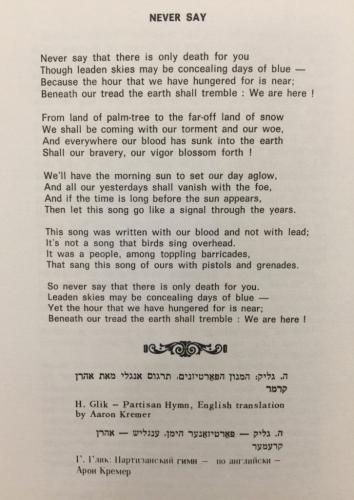
Never say that there is only death for you,
Though leaden skies may be concealing days of blue,
Because the hour we have hungered for near;
Beneath our tread the earth shall tremble -- we are here!
Because the hour we have hungered for near;
Beneath our tread the earth shall tremble -- we are here!
From land of palm tree to the far-off land of snow,
We shall be coming with our torment and our woe;
And everywhere our blood has sunk into the earth,
Shall our bravery, our vigor blossom forth.
And everywhere our blood has sunk into the earth,
Shall our bravery, our vigor blossom forth.
We'll have the morning sun to set our day aglow,
And all our yesterdays shall vanish with the foe;
And if the time is long before the sun appears,
Then let this song go like a signal through the years.
And if the time is long before the sun appears,
Then let this song go like a signal through the years.
This song was written with blood and not with lead;
It's not a song that summer birds sing overhead;
It was a people among toppling barricades,
That sang this song of ours with pistols and grenades.
It was a people among toppling barricades,
That sang this song of ours with pistols and grenades.
Never say that there is only death for you,
Though leaden skies may be concealing days of blue,
Because the hour we have hungered for is near;
Beneath our tread the earth shall tremble, -- we are here!
Because the hour we have hungered for is near;
Beneath our tread the earth shall tremble, -- we are here!
Contributed by Riccardo Venturi
Never say the final journey is at hand
Never say we will not meet the Promised Land,
The longed-for hour shall come, oh never fear!
Our tread drums forth the tidings - we are here!
The longed-for hour shall come, oh never fear!
Our tread drums forth the tidings - we are here!
From land of palm-tree to the far-off land of snow,
We shall be coming with our torment and our woe.
And everywhere our blood has sunk into the earth,
Shall our bravery, our vigor blossom forth!
And everywhere our blood has sunk into the earth,
Shall our bravery, our vigor blossom forth!
We’ll have the morning sun to set our day aglow,
And all our yesterdays shall vanish with the foe,
And if the time is long before the sun appears,
Then let this song go like a signal through the years.
And if the time is long before the sun appears,
Then let this song go like a signal through the years.
This song was written with our blood and not with lead;
It’s not a song that birds sing overhead,
It was a people, among toppling barricades,
That sang this song of ours with pistols and grenades.
It was a people, among toppling barricades,
That sang this song of ours with pistols and grenades.
So never say that there is only death for you.
Leaden skies may be concealing days of blue -
Because the hour we have hungered for is near;
Beneath our tread the earth shall tremble: We are here!
Because the hour we have hungered for is near;
Beneath our tread the earth shall tremble: We are here!
Contributed by Riccardo Venturi - 2017/3/11 - 07:33
Never say this is the final road for you,
Though leaden skies may cover over days of blue.
As the hour that we longed for is so near,
Our step beats out the message: we are here!
As the hour that we longed for is so near,
Our step beats out the message: we are here!
From lands so green with palms to lands all white with snow.
We shall be coming with our anguish and our woe,
And where a spurt of our blood fell on the earth,
There our courage and our spirit have rebirth!
And where a spurt of our blood fell on the earth,
There our courage and our spirit have rebirth!
The early morning sun will brighten our day,
And yesterday with our foe will fade away,
But if the sun delays and in the east remains –
This song as motto generations must remain.
But if the sun delays and in the east remains –
This song as motto generations must remain.
This song was written with our blood and not with lead,
It's not a little tune that birds sing overhead,
This song a people sang amid collapsing walls,
With pistols in hand they heeded to the call.
But if the sun delays and in the east remains –
This song as motto generations must remain.
Therefore never say the road now ends for you,
Though leaden skies may cover over days of blue.
As the hour that we longed for is so near,
Our step beats out the message: we are here!
As the hour that we longed for is so near,
Our step beats out the message: we are here!
Contributed by Riccardo Venturi - 2017/3/11 - 07:42
Traduction française de Charles Dobzynski (1987)
Chant du ghetto de Varsovie
Ne dis jamais que tu vas de ton dernier pas,
Quand les jours bleus sont écrasés sous un ciel bas,
L’heure viendra, que nous avons tant espérée,
Frappant le sol, nos pas diront: Nous sommes là!
L’heure viendra, que nous avons tant espérée,
Frappant le sol, nos pas diront: Nous sommes là!
Des palmiers verts jusqu’aus lointains pays neigeux,
Nous sommes là! Le coeur en peine et douloureux,
Où notre sang, goutte après goutte, fut semé,
Notre courage et notre force vont germer.
Où notre sang, goutte après goutte, fut semé,
Notre courage et notre force vont germer.
Soleil futur tu embellis le jour présent,
Hier est l’ombre où disparaîtront nos tyrans,
Si le soleil se perd avant le jour levant,
Tel un appel d’âge en âge soit notre chant.
Si le soleil se perd avant le jour levant,
Tel un appel d’âge en âge soit notre chant.
Il fut écrit, ce chant, par le sang, par le feu,
Ce n’est pas le chant d’un oiseau dans le ciel bleu,
Quand tout brûlait, parmi les murs qui s’écroulaient,
Fusil en main mon peuple a chanté ces couplets.
Quand tout brûlait, parmi les murs qui s’écroulaient,
Fusil en main mon peuple a chanté ces couplets.
Ne dis jamais que tu vas de ton dernier pas,
Quand les jours bleus sont écrasés sous un ciel bas,
L’heure viendra que nous avons tant espérée,
Frappant le sol nos pas diront: Nous sommes là!
L’heure viendra que nous avons tant espérée,
Frappant le sol nos pas diront: Nous sommes là!
Contributed by Riccardo Venturi - 2017/3/11 - 08:59
French version by Irene Kanfer
Version française d'Irene Kanfer
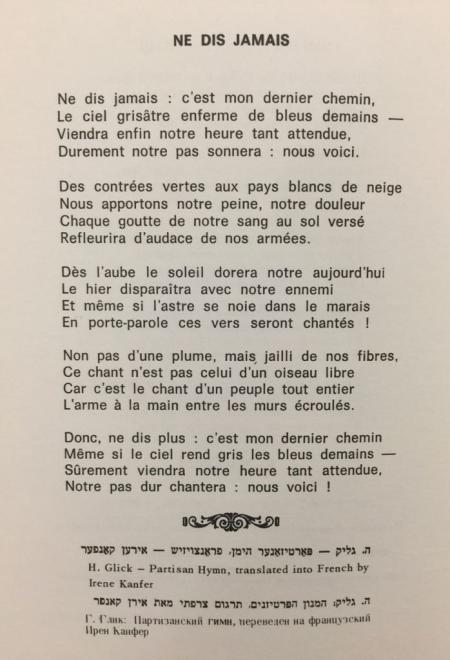
Sul sito di Eli Rabinowitz è presente soltanto l'immagine ripresa dalla brochure di Leizer Ran (1972), con indicazione del traduttore. La abbiamo qui riprodotta testualmente.
Eli Rabinowitz's website includes only an image taken from Leizer Ran's brochure, with the translator's name. We have reproduced it here as a text.
Ne dis jamais : C'est mon dernier chemin,
Le ciel grisâtre enferme de bleus demains -
Viendra enfin notre heure tant attendue,
Durement notre pas sonnera: nous voici.
Des contrées vertes aux pays blancs de neige
Nous apportons notre peine, notre douleur
Chaque goutte de notre sang au sol versé
Refleurira d'audace de nos armées.
Dès l'aube le soleil dorera notre aujourd'hui
Le hier disparaîtra avec notre ennemi
Et même si l'astre se noie dans le marais
En porte-parole ces vers seront chantés !
Non pas d'une plume, mais jailli de nos fibres,
Ce chant n'est pas celui d'un oiseau libre
Car c'est le chant d'un peuple tout entier
L'arme à la main entre les murs écroulés.
Donc, ne dis plus: C'est mon dernier chemin,
Même si le ciel rend gris les bleus demains,
Sûrement viendra notre heure tant attendue,
Notre pas dur chantera: nous voici !
Contributed by Riccardo Venturi - 2017/9/4 - 19:59
(Ne dis jamais)
Ne dis jamais que c’est ton denier chemin
Malgré les cieux de plomb qui cachent le bleu du jour
Car sonnera pour nous l’heure tant attendue
Nos pas feront retentir ce cri : nous sommes là
Car sonnera pour nous l’heure tant attendue
Nos pas feront retentir ce cri : nous sommes là
Le soleil illuminera notre présent
Les nuits noires disparaîtront avec l’ennemi
Et si le soleil devait tarder à l’horizon
Ce chant se transmettra comme un appel
Et si le soleil devait tarder à l’horizon
Ce chant se transmettra comme un appel
Ce chant n’a pas été écrit avec un crayon mais avec du sang
Ce n’est pas le chant d’un oiseau en liberté :
Un peuple entouré de murs qui s’écroulent
l’a chanté, nagan [1] à la main
Un peuple entouré de murs qui s’écroulent
l’a chanté, nagan à la main
Du vert pays des palmiers jusqu’au pays des neiges blanches
Nous arrivons avec nos souffrances et nos douleurs
Et là où est tombé la plus petite goutte de sang
Jaillira notre héroïsme et notre courage
Et là où est tombé la plus petite goutte de sang
Jaillira notre héroïsme et notre courage
C’est pourquoi ne dis jamais que c’est ton dernier chemin
Malgré les cieux de plomb qui cachent le bleu du jour
Car sonnera pour nous l’heure tant attendue
Nos pas feront retentir ce cri : nous sommes là
Car sonnera pour nous l’heure tant attendue
Nos pas feront retentir ce cri : nous sommes là
Contributed by Riccardo Venturi - 2005/6/28 - 15:11
Jüdisches Partisanenlied
Sage nimmer mehr, du gehst den letzten Gang,
weil Gewölk wie Blei den blauen Tag verschlang.
Die ersehnte Stunde kommt und sie ist nah -
unser Massenschritt wird pauken: Wir sind da.
Die ersehnte Stunde kommt und sie ist nah -
unser Massenschritt wird pauken: Wir sind da.
Aus der Welt der Palmen - Welt von Eis und Schnee-
kommen wir mit unsrer Pein, mit unsrem Weh.
Wo ein Tropfen ward verspritzt von unserem Blut,
werden sprießen unsre Flinten, unser Mut.
Wo ein Tropfen ward verspritzt von unserem Blut,
werden sprießen unsre Flinten, unser Mut.
Unser Tag im goldnen Morgenlichte scheint -
unser Gestern wird verschwinden mit dem Feind.
Ob der Himmel uns die Sonne überzieht -
unsren Enkeln sei Parole unser Lied.
Ob der Himmel uns die Sonne überzieht -
unsren Enkeln sei Parole unser Lied.
Dieses Lied steht da in Blut und nicht in Blei.
Sang kein Vogel diese Weise, leicht und frei -
zwischen stürzendem Gemäuer, Rauch und Brand
sang ein Volk dies Lied, die Waffe in der Hand.
zwischen stürzendem Gemäuer, Rauch und Brand
sang ein Volk dies Lied, die Waffe in der Hand.
So sage nimmer mehr, du gehst den letzten Gang,
weil Gewölk wie Blei den blauen Tag verschlang.
Die ersehnte Stunde kommt und sie ist nah -
unser Massenschritt wird pauken: Wir sind da.
Die ersehnte Stunde kommt und sie ist nah -
unser Massenschritt wird pauken: Wir sind da.
Contributed by Riccardo Venturi - 2005/6/27 - 03:28
German Adaptation ("Nachdichtung") by Heinz Kahlau
Reproduced from anarchismus.at, an Austrian anarchist website: "Der berühmteste jüdische PartisanInnenensong, geschrieben 1943 von Hirsh Glick im Ghetto von Vilnius."
Sage nie, du gehst den allerletzten Weg,
wenn Gewitter auch das Blau vom Himmel fegt.
Die ersehnte Stunde kommt, sie ist schon nah,
dröhnen werden unsre Schritte, wir sind da!
Vom grünen Palmenland bis weit zum Land voll Schnee
kommen wir mit unsrer Pein, mit unserm Weh.
Und wohin ein Tropfen fiel von unserm Blut,
sprießen für uns neue Kräfte, neuer Mut.
Der Tag wird golden, wenn erst Morgensonne scheint,
und die schwarze Nacht verschwindet mit dem Feind.
Und zögert auch die Sonne noch am Horizont,
ist unser Lied dafür Gewißheit, daß sie kommt.
Das Lied, wir schrieben es mit Blut und
nicht mit Blei, das ist kein Lied von einem Vogel froh und frei.
Es hat ein Volk gestanden zwischen Rauch und Brand,
das Lied gesungen, mit den Waffen in der Hand.
Drum sage nie, du gehst den allerletzten Weg,
wenn Gewitter auch das Blau vom Himmel fegt.
Die ersehnte Stunde kommt, sie ist schon nah,
dröhnen werden unsre Schritte, wir sind da!
Contributed by Riccardo Venturi - 2017/9/4 - 10:20
German version by Hubert Witt
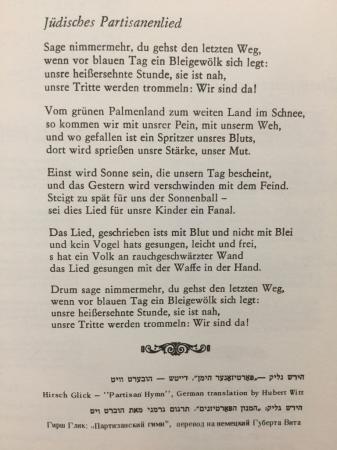
Sul sito di Eli Rabinowitz è presente soltanto l'immagine ripresa dalla brochure di Leizer Ran (1972), con indicazione del traduttore. La abbiamo qui riprodotta testualmente.
Eli Rabinowitz's website includes only an image taken from Leizer Ran's brochure, with the translator's name. We have reproduced it here as a text.
Sage nimmermehr, du gehst den letzten Weg,
wenn vor blauen Tag ein Bleigewölk sich legt :
unsre heißensehnte Stunde, sie ist nah,
unsre Tritte werden trommeln: Wir sind da !
Vom grünen Palmenland zum weiten Land im Schnee,
so kommen wir mit unsrer Pein, mit unserm Weh,
und wo gefallen ist ein Spritzer unsres Bluts,
dort wird sprießen unsre Stärke, unser Mut.
Einst wird Sonne sein, die unsern Tag bescheint,
und das Gestern wird verschwinden mit dem Feind.
Steigt zu spät für uns der Sonnenball -
sei dies Lied für unsre Kinder ein Fanal.
Das Lied, geschrieben ists mit Blut und nicht mit Blei
und kein Vogel hats gesungen, leicht und frei,
's hat ein Volk aus rauchgeschwärtzter Wand
das Lied gesungen mit der Waffe in der Hand.
Drum nimmermehr, du gehst den letzten Weg,
wenn vor blauen Tag ein Bleigewölk sich legt :
unsre heißensehnte Stunde, sie ist nah,
unsre Tritte werden trommeln: Wir sind da !
Contributed by Riccardo Venturi - 2017/9/4 - 20:27
Anonymous German version
This anonymous version is included as a text in Eli Rabinowitz's website, but it is interlarded with misspellings which have been corriged here.
Sag nicht keinmal das du gehst den letzten Gang
Wenn auch der Himmel Trüb und dein Herz ist bang
kommen wird noch unsre heldenhafte Schar
unsre Schritte werden dröhnen, – “Wir sind da”.
Vom grünen Palmenland bis weitem Land aus Schnee
Wir kommen an mit unsrem Leid, mit unsrem Weh
und wo gefallen ist ein Spritz von unserm Blut
wachsen wird dort unsre Kraft und unser Mut.
Es ist die Morgensonne die uns golden scheint
und die Vergangenheit verschwindet mit dem Feind
doch unser Kampf steht heute uns bevor
wie ein Fanal soll gehen das Lied von Tor zu Tor.
Das Lied geschrieben ist mit Blut und nicht mit Blei
Es ist kein Liedel von dem Vogel, leicht und frei
es hat ein Volk zwischen eingestürzten Wänden
das Lied geschrieben mit Pistolen in den Händen.
Sag nicht keinmal das du gehst den letzten Gang
Wenn auch der Himmel Trüb und dein Herz ist bang
kommen wird noch unsre heldenhafte Schar
unsre schritte werden dröhnen, – Wir sind da.
Contributed by Riccardo Venturi - 2017/9/4 - 20:47
Nunca digas que esta senda es la final.
Acero y plomo oculta un cielo celestial.
Nuestra hora tan soñada llegará,
redoblará nuestro marchar "¡Henos acá!".
Nuestra hora tan soñada llegará,
redoblará nuestro marchar "¡Henos acá!".
Desde las nieves a las palmas de Sión,
henos aqui con el dolor de esta canción.
Mas donde nuestra sangre caiga o caerá,
Nuestro valor, nuestro heroismo brotará.
Mas donde nuestra sangre caiga o caerá,
Nuestro valor, nuestro heroismo brotará.
La luz del alba nuestro día alumbrará,
con el ayer al enemigo borrará.
Pero, si tarda, pasará nuestra canción
como consigna de una a otra generación.
Pero, si tarda, pasará nuestra canción
como consigna de una a otra generación.
Con sangre y plomo esta canción escrita está.
No es la de un pájaro que vive en libertad,
sino de un pueblo que entre muerte y destrucción
cantó con armas en la mano esta canción.
sino de un pueblo que entre muerte y destrucción
cantó con armas en la mano esta canción.
Y nunca digas que esta senda es la final.
Acero y plomo oculta un cielo celestial.
Nuestra hora tan soñada llegará,
redoblará nuestro marchar "¡Henos acá!".
Nuestra hora tan soñada llegará,
redoblará nuestro marchar "¡Henos acá!".
Contributed by Alessandro - 2009/12/22 - 13:29
Spanish version by S. Nudelshtecher
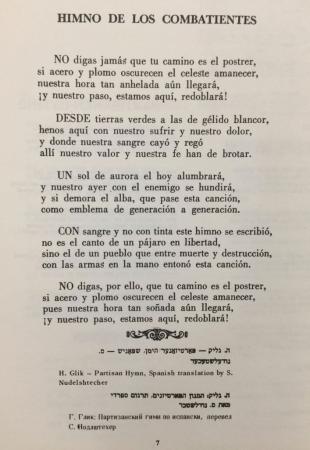
Sul sito di Eli Rabinowitz è presente soltanto l'immagine ripresa dalla brochure di Leizer Ran (1972), con indicazione del traduttore. La abbiamo qui riprodotta testualmente.
Eli Rabinowitz's website includes only an image taken from Leizer Ran's brochure, with the translator's name. We have reproduced it here as a text.
No digas jamás que tu camino es el postrer,
si acero y plomo oscurecen el celeste amanecer,
nuestra hora tan anhelada aún llegará,
¡y nuestro paso, estamos aquí, redoblará!
Desde tierras verdes a las de gélido blancor,
henos aquí con nuestro sufrir y nuestro dolor,
y donde nuestra sangre cayó y regó
allí nuestro valor y nuestra fe han de brotar.
Un sol de aurora el hoy alumbrará,
y nuestro ayer con el enemigo se hundirá,
y si demora el alba, que pase esta canción,
como emblema de generación a generación.
Con sangre y no con tinta este himno se escribió,
no es el canto de un pájaro en libertad,
sino el de un pueblo que entre muerte y destrucción,
con las armas en la mano entonó esta canción.
No digas jamás que tu camino es el postrer,
si acero y plomo oscurecen el celeste amanecer,
nuestra hora tan anhelada aún llegará,
¡y nuestro paso, estamos aquí, redoblará!
Contributed by Riccardo Venturi - 2017/9/3 - 23:32
Versão portuguesa do prof. Pietro Nardella Dellova
Não diga nunca que este é o nosso último caminho
Ainda que as nuvens escondam o horizonte
Virá ainda a nossa hora tanto esperada
Ressonará o nosso passo ainda “estamos aqui”
Virá ainda a nossa hora tanto esperada
Ressonará o nosso passo ainda “estamos aqui”
Das terras de verdes palmeiras até as terras de brancas neves
Non viremos com a dor do nosso sofrimento
E onde caiu cada gota do nosso sangue
Ali mesmo florescerá a nossa coragem, o nosso heroísmo
E onde caiu cada gota do nosso sangue
Ali mesmo florescerá a nossa coragem, o nosso heroísmo
Esta canção foi escrita com o sangue, não com tinta,
não é uma canção de um pássaro livre
é escrita por um povo preso dentro de muros
e a cantou com o fuzil na mão
é escrita por um povo preso dentro de muros
e a cantou com o fuzil na mão
O sol da manhã iluminará como ouro o nosso hoje
E o nosso ontem desaparecerá com o nosso inimigo
Mas, ainda que o sol e a alvorada tardem
Como um mandamento, esta canção passará de geração em geração.
Mas, ainda que o sol e a alvorada tardem
Como um mandamento, esta canção passará de geração em geração.
Não diga nunca que este é o nosso último caminho
Ainda que as nuvens escondam o horizonte
Virá ainda a nossa hora tanto esperada
Ressonará o nosso passo ainda “estamos aqui”
Virá ainda a nossa hora tanto esperada
Ressonará o nosso passo ainda “estamos aqui”.
Contributed by Pietro Nardella Dellova - 2012/1/16 - 17:59
Romanian version by "E.D."
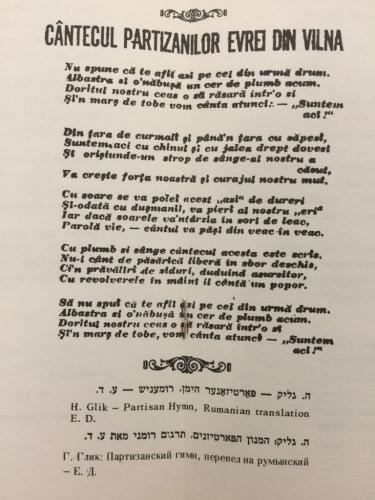
La versione romena (di un anonimo “E.D.”) è stata ricopiata e resa fruibile testualmente dal sito di Eli Rabinowitz (Sezione “Words”), che riporta solo l'immagine ripresa dalla brochure di Leizer Ran. Si avverte che il romeno della versione è scritto secondo i canoni ortografici degli anni '40 circa (p.es. “aci” per “aici”, “sbor” per “zbor” ecc.).
The Romanian version (by an anonymous “E.D.”) has been directly copied ad made available as a text from Eli Rabinowitz's website (Section “Words”), including only the image taken from Leizer Ran's brochure. You are advised that the Romanian used for this version shows the typical spelling of the 40's (e.g. “aci” for “aici”, “sbor” for “zbor” etc.)
Nu spune că te afli azi pe cel din urmă drum
Albastra şi o 'năbuşă un cer de plumb acum.
Doritul nostru ceas o să răsară într'o zi
Şi'n marş de tobe vom cânta atunci: - “Suntem aci!”
Din ţara de curmalt şi până'n ţara cu zăpezi,
Suntem aci cu chinul şi cu jalea drept dovezi
Şi orişiunde-un strop de sânge-al nostru a căzut,
Va creşte forţa noastră şi curajul nostru mut.
Cu soare se va polei acest “azi” de dureri
Şi odată cu duşmanii va pieri al nostri “eri”
Iar dacă soarele va 'ntârzia în zori de leac
Parolă vie, - cântul va păşi din veac-în veac.
Cu plumb şi sânge cântecul acesta este scris,
Nu-i cânt de păsărică liberă în sbor deschis,
Ci 'n prăvăliri de ziduri, duduid asurzitor,
Cu revolverele în mâini îl cântă un popor.
Nu spune că te afli azi pe cel din urmă drum
Albastra şi o 'năbuşă un cer de plumb acum.
Doritul nostru ceas o să răsară într'o zi
Şi'n marş de tobe vom cânta atunci: - “Suntem aci!”
Contributed by Riccardo Venturi - 2017/9/1 - 22:14
Greek translation by Riccardo Venturi
Μετέφρασε στα Ελληνικά ο Ρικάρντος Βεντούρης
04-09-2017 19:31
The following word-for-word translation cannot be sung. It has been specially made for this site.
Χιρς Γκλικ, 1943
Ποτέ μην πεις πως έφτασες οριστικά στο τέλος
Όταν ο μολυβένιος ουρανός προμηνά ένα μαύρο μέλλον
Γιατί σίγουρα η ώρα που λαχταράμε θα 'ρθει
Και τα βήματά μας κραταιά θα αντηχούν: Είμαστε δω.
Από τις πράσινες παλάμες έως τα άσπρα χιόνια
Ήρθαμε με τον πόνο και τις λύπες μας
Κι όπου χύθηκε μια σταγόνα απ' το αίμα μας
Θ' ανθίσει με κουράγιο ο ηρωισμός μας.
Ο ήλιος μας δίνει σήμερα χρυσό φως,
Το χτες θα χαθεί μαζί με τον εχθρό,
Μα ακόμα κι αν ανατείλει ο ήλιος πιο αργά
Σα σύνθημα θα περάσει το άσμα αυτό από γενιά σε γενιά.
Γράφτηκε το άσμα αυτό μέ αίμα, όχι με μελάνη,
Δεν είναι κελάηδημα ελεύθερων πουλιών,
Το έγραψ' ένας λαός μέσ' σε τοίχους που κατάρρεαν απάνω
Και το τραγούδησε με πολυβόλα στα χέρια.
Ποτέ μην πεις πως έφτασες οριστικά στο τέλος
Όταν ο μολυβένιος ουρανός προμηνά ένα μαύρο μέλλον
Γιατί σίγουρα η ώρα που λαχταράμε θα 'ρθει
Και τα βήματά μας κραταιά θα αντηχούν: Είμαστε δω.
Nederlandse vertaling van Luc Wynants uit de zijde van Strijdkoor Kontrarie
Zeg nooit dat je de laatste weg gaat,
Al bedekken onheilspellende wolken de heldere lucht,
Het uur waar we zo naar verlangen zal zeker komen
Onze dreunende stappen zullen klinken: wij leven.
Het uur waar we zo naar verlangen zal zeker komen
Onze dreunende stappen zullen klinken: wij leven.
Van het land waar palmen groeien tot het land van sneeuw
Komen wij, met ons leed, met onze pijn
En waar ons bloed gevloeid heeft
Daar zullen onze kracht en onze moed weer open bloeien.
En waar ons bloed gevloeid heeft
Daar zullen onze kracht en onze moed weer open bloeien.
De zon van morgen zal het heden overstralen,
Met de vijand zal de duisternis verdwijnen.
Maar komt er geen nieuwe dageraad en zou de zon niet schijnen,
Dan zal ons lied als een parool klinken.
Maar komt er geen nieuwe dageraad en zou de zon niet schijnen,
Dan zal ons lied als een parool klinken.
Niet met inkt, maar met bloed is ons lied geschreven,
Het is niet het lied van een vogel die in vrijheid zingt,
Maar bij het instorten van de muren
Heeft een volk gezongen met geweren in de hand.
Maar bij het instorten van de muren
Heeft een volk gezongen met geweren in de hand.
Dus zeg nooit dat je de laatste weg gaat,
Al bedekken onheilspellende wolken de heldere lucht,
Het uur waar we zo naar verlangen zal zeker komen
Onze dreunende stappen zullen klinken: wij leven.
Het uur waar we zo naar verlangen zal zeker komen
Onze dreunende stappen zullen klinken: wij leven.
Contributed by Riccardo Venturi
Dutch version by I. Fuchs
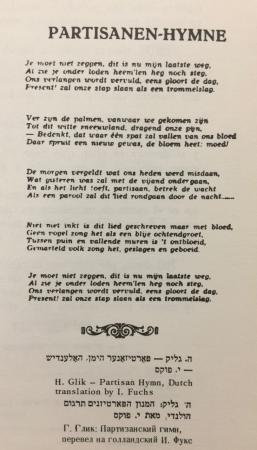
Sul sito di Eli Rabinowitz è presente soltanto l'immagine ripresa dalla brochure di Leizer Ran (1972), con indicazione del traduttore. La abbiamo qui riprodotta testualmente.
Eli Rabinowitz's website includes only an image taken from Leizer Ran's brochure, with the translator's name. We have reproduced it here as a text.
Je moet niet zeggen, dit is nu mijn laatste weg,
Al zie je onder loden heem'len heg noch steg,
Ons verlangen wordt vervuld, eens gloort de dag,
Prezent' zal onze stap slaan als een trommelslag.
Ver zijn de palmen, vanwaar wij gekomen zijn,
Tot dit witte sneeuwland, dragend onze pijn,
- Bedenkt, dat waar één spat zal vallen van ons bloed,
Daar spruit een nieuw gewas, de bloem heet: moed!
De morgen vergeldt wat ons heden werd misdaan,
Wat gisteren was zal met de vijand ondergaan,
En als het licht toeft, partisan, betrek de wacht,
Als en parool zal dit lied rondgaan door de nacht.
Niet met inkt is dit lied geschreven maar met bloed,
Geen vogel zong het als een blije ochtendgroet,
Tussen puin en vallende muren is 't ontbloeid,
Gemarteld volk zong het, geslagen en geboeid.
Je moet niet zeggen, dit is nu mijn laatste weg,
Al zie je onder loden heem'len heg noch steg,
Ons verlangen wordt vervuld, eens gloort de dag,
Prezent' zal onze stap slaan als een trommelslag.
Contributed by Riccardo Venturi - 2017/9/4 - 11:02
Svensk version av Lennart Kerbel (1999)
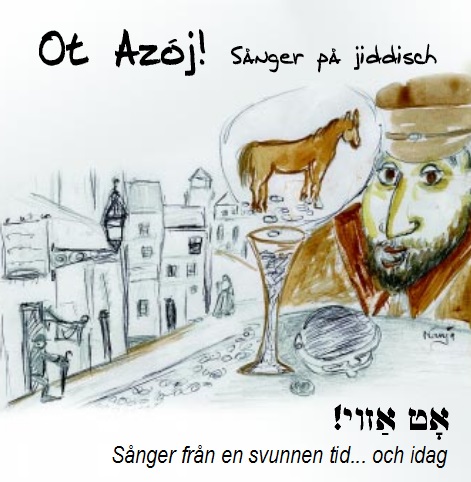
Traduzione letterale a corredo dell'interpretazione in lingua originale di Basia Frydman nell'album antologico di canzoni yiddish Ot azój! - Sånger på jiddisch, del 1998. Tutte le trascrizioni e le traduzioni svedesi nell'album sono di Lennart Kerbel. Si tratta di una versione a quattro strofe (manca la terza).
Säg aldrig att du går den sista vägen
fast blytyngd himmel skymmer blåa dagar.
Den timme vi längtar efter ska komma.
Jorden ska skälva under våra steg.
Från gröna palmers land till snöhljt land
kommer vi med vår piuna och vårt betryck.
Där en droppe fallit av vårt blod,
ska vårt hjältemod spira.
Vår sång är skriven med blod och ej med penna,
det är ej en visa om en fågel fri.
Den skrevs av ett folk mellan fallande väggar,
den sjöngs med revolvrar i händerna!
Så säg aldrig att du går den sista vägen
fast blytyngd himmel skymmer blåa dagar.
Den timme vi längtar efter ska komma.
Jorden ska skälva under våra steg.
Contributed by Riccardo Venturi - 2017/3/12 - 05:31
Omsetting frå jiddisch: Copyright 1998 - Olve Utne
Da / frå: alnakka.net : Hirsch Glik
Sei du aldri at du går den siste veg
når stålgrå skyor gjømmer sola vekk for deg —
For ein gong kjem for visst vår etterlengta tid,
og jorda dundrar under marsjen: «Her er vi!»
Frå grøne palmeland til land med kvite snø
vi kjem i rekkje med vår sorg og med vår nød,
og kor det falle har ein drope av vårt blod, —
der skal vise seg vår styrke og vårt mot.
Og morgonsola skal forgylle denna dag,
og vekk’ er gårsdagen og fienden i lag;
men om no sola kjem for seint ått jordas rand —
som ein parole songen går med ætters gang.
Og skriven songen er med blod og ikkje bly,
d’er ingen visestubb om fuglen høgt i sky;
eit folk iblant ruinar i eit herja land
har sunge songen med geværet i si hand.
Så sei du aldri at du går den siste veg
når stålgrå skyor gjømmer sola vekk for deg —
For ein gong kjem for visst vår etterlengta tid,
og jorda dundrar under marsjen: «Her er vi!»
Contributed by Riccardo Venturi - 2017/3/11 - 23:38
Nynorsk gjendikting av Erling Outzen
Sei du aldri at du går den siste veg,
Om så tung ein sky gjer dagen mørk for deg.
Den dag du drøymer om vil demre i din by,
Og våre skritt skal høyrast: Vi er her på ny!
Frå grøne palmeland til kvite land med snø,
Vil vi komme, over land og over sjø.
Og kor hen det fall ein dråpe av vårt blod,
Vil kvar liten bekk av mot bli til ein flod.
Den gylne morgonsol skal gi oss lys igjen,
Og fortida forsvinn, som fienden.
Men om sola let oss vente før ho glør,
Skal songen gå som eld til yngre brør.
Denne song er gjort av blod, og ikkje bly.
Han liknar ikkje fuglesong ved morgongry.
Det var eit folk som i ruinar mens det brann,
Song denne songen med pistolen i si hand.
Så sei du aldri at du går den siste veg,
Om så tung ein sky gjer dagen mørk for deg.
Den dag du drøymer om vil demre i din by,
Og våre skritt skal høyrast: Vi er her på ny!
Contributed by Riccardo Venturi - 2017/3/12 - 20:41
Русский перевод Переца Маркиша
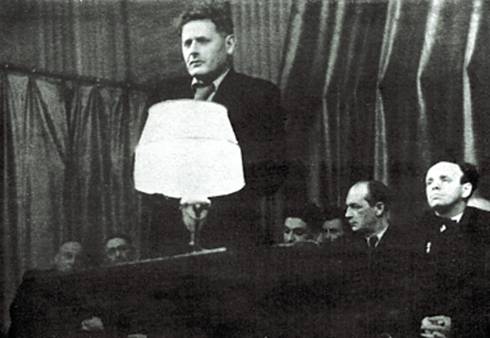
La versione russa di Perec Davidovič Markiš (in yiddish: פּרץ מאַרקיש ) risale probabilmente alla fine degli anni '40, ma fu pubblicata in volume soltanto nel 1960. Nel frattempo, il poeta ebreo russo di lingua yiddish era stato messo a morte, il 12 agosto 1952, durante la tristemente nota ”Notte dei poeti assassinati” alla prigione della Lubjanka. Markiš era nato il 7 dicembre 1895 a Polonnoe, in Ucraina. Dopo la liquidazione del Comitato Antifascista Ebraico, voluta da Stalin e che portò alla “Notte dei poeti assassinati”, Markiš fu “riabilitato” nel 1955. Le sue poesie in yiddish vennero tradotte in russo da Anna Achmatova. Il testo è qui accompagnato da una trascrizione in caratteri latini.
Партизанский гимн «Не говори, что ты идёшь в последний путь» (идиш זאָג ניט קיינמאל, אז דו גייסט דעם לעצטן וועג), известный также как «Гимн еврейских партизан», был написан в 1942 году на мелодию песни братьев Покрасс «То не тучи — грозовые облака». В СССР гимн еврейских партизан был впервые опубликован в книге А.Суцкевера «Фун Вильнер гетто» («Виленское гетто») издательства «Дер эмес» в 1946 году. На русском языке гимн был опубликован в «Избранных произведениях» П.Маркиша в 1960 году. Он был переведён на десятки языков, исполнялся в разных странах. Среди исполнителей гимна был Поль Робсон, который спел его на идише на знаменитом концерте в Москве в 1949 году, в разгар кампании по «борьбе с космополитизмом».
Слова гимна высечены на памятнике еврейским партизанам в Бат-Яме.
Каждый год во время отмечания годовщины восстания в Варшавском гетто хор Войска Польского исполняет его на идиш. - ru.wikipedia - Глик, Гирш
Никогда не говори - не позабудь! -
Что идешь ты в свой последний грустный путь.
Он придет, пробьет великий этот час -
Простучат шаги: "Мы здесь. Мы судим вас!"
Он придет, пробьет великий этот час -
Простучат шаги: "Мы здесь. Мы судим вас!"
От зеленых пальм до голубых снегов
Мы проходим с болью двадцати веков.
Где упала капля нашей крови - там
Мужество взойдет, рванется к небесам.
Где упала капля нашей крови - там
Мужество взойдет, рванется к небесам.
Утреннее солнце золотит наш день.
Сгинет враг, и сгинет даже вражья тень.
Если прояснится даль не до конца -
Сын узнает песню эту от отца.
Если прояснится даль не до конца -
Сын узнает песню эту от отца.
Мы писали кровью, кровью не свинцом,
Это не синичка свищет над крыльцом.
Это в старом гетто скорбный наш народ,
Сжав в руках гранаты, песнь свою поет.
Это в старом гетто скорбный наш народ,
Сжав в руках гранаты, песнь свою поет.
Никогда не говори - не позабудь! -
Что идешь ты в свой последний грустный путь.
Он придет, пробьет великий этот час -
Простучат шаги: "Мы здесь. Мы судим вас!"
Он придет, пробьет великий этот час -
Простучат шаги: "Мы здесь. Мы судим вас!"
Nikogda ne govori – ne pozabuď! -
Čto ideš' ty v svoj poslednij grustnyj puť.
On pridet, prob'et velikij ėtot čas -
Prostučat šagi: “My zdeś. My sudim vas!”
On pridet, prob'et velikij ėtot čas -
Prostučat šagi: “My zdeś. My sudim vas!”
Ot zelenyx palm do gołubyx snegov
My proxodim s bolju dvadcati vekov.
Gde upała kaplja našej krovi – tam
Mužestvo vzojdet, rvanetsja k nebesam.
Gde upała kaplja našej krovi – tam
Mužestvo vzojdet, rvanetsja k nebesam.
Utrennee sołnce zołotit naš deń.
Sginet vrag, i sginet daže vraźa teń.
Esli projasnitsja dal ne do konca -
Syn uznaet pesnju ėtu ot otca.
Esli projasnitsja dal ne do konca -
Syn uznaet pesnju ėtu ot otca.
My pisali krov'ju, krov'ju ne svincom,
Ėto ne sinička svišćet nad krylcom.
Ėto v starom getto skorbnyj naš narod,
Sžav v rukax granaty, pesń svoju poet.
Ėto v starom getto skorbnyj naš narod,
Sžav v rukax granaty, pesń svoju poet.
Nikogda ne govori – ne pozabuď! -
Čto ideš' ty v svoj poslednij grustnyj puť.
On pridet, prob'et velikij ėtot čas -
Prostučat šagi: “My zdeś. My sudim vas!”
On pridet, prob'et velikij ėtot čas -
Prostučat šagi: “My zdeś. My sudim vas!”
Contributed by Riccardo Venturi - 2008/9/28 - 21:06
Russian version by Leon Feinberg
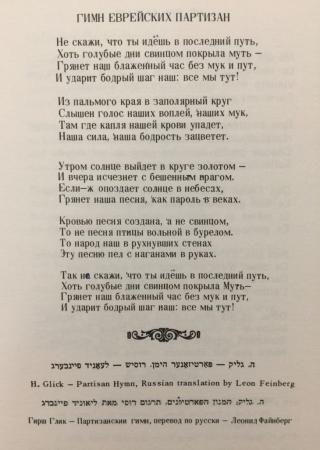
Sul sito di Eli Rabinowitz è presente soltanto l'immagine ripresa dalla brochure di Leizer Ran (1972), con indicazione del traduttore. La abbiamo qui riprodotta testualmente.
Eli Rabinowitz's website includes only an image taken from Leizer Ran's brochure, with the translator's name. We have reproduced it here as a text.
Не скажи, что ты идëшь в последний путь,
Хоть голубые дни свинцом покрыла муть -
Грянет наш блаженный час без мук и пут,
И ударит бордый шаг наш: все мы тут !
Из пальмого края в заполярный круг
Слышен голос наших воплей, наших мук,
Там где капля нашей крови упадет,
Наша сила, наша бодрость зацветет.
Утром солнце выйдет в круге золотом -
И вчера исчезнет с бешенным врагом.
Если-ж опоздает солнце в небесах,
Грянет наша песня, как пароль в веках.
Кровью песня создана, а не свинцом,
То не песня птицы вольной в бурелом.
То народ наш в рухнувших стенах
Эту песню пел с наганами в руках.
Так не скажи, что ты идëшь в последний путь,
Хоть голубые дни свинцом покрыла муть -
Грянет наш блаженный час без мук и пут,
И ударит бордый шаг наш: все мы тут !
Ne skaži, čto ty idëś v poslednij puť,
Xoť gołubye dni svincom pokryła muť -
Grjanet naš błažennyj čas bez muk i put,
I udarit bordyj šag naš: vse my tut !
Iz palmogo kraja v zapoljarnyj krug
Słyšen gołos našix voplej, našix muk,
Tam gde kaplja našej krovi upadet,
Naša siła, naša bodrosť zacvetet.
Utrom sołnce vyjdet v kruge zołotom -
I včera isčeznet s bešennyj vragom.
Esli-ž opozdaet sołnce v nebesax,
Grjanet naša pesnja, kak parol v vekax.
Krov'ju pesnja sozdana, a ne svincom,
Tone pesnja pticy volnoj v burełom.
To narod naš v ruxnuvšix stenax
Ėtu pesnju peł s naganami v rukax.
Tak ne skaži, čto ty idëś v poslednij puť,
Xoť gołubye dni svincom pokryła muť -
Grjanet naš błažennyj čas bez muk i put,
I udarit bordyj šag naš: vse my tut !
Contributed by Riccardo Venturi - 2017/9/5 - 11:49
Polish version by Miriam Gold, performed, among others, by Michał Hochman.
The translator's name is stated in Leizer Ran's brochure (1972), reproduced in Eli Rabinowitz's website (Section: Words)
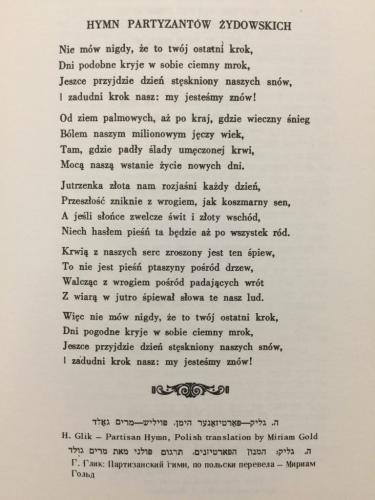
Nie mów nigdy, że to twój ostatni krok,
Dni pogodne kryje w sobie ciemny mrok.
Jeszcze przyjdzie dzień stęskniony naszych snów,
I zadudni krok nasz – my jesteśmy znów.
Od ziem palmowych, aż po kraj gdzie wieczny śnieg,
Bólem naszym milionowym jęczy wiek.
Tam gdzie padły ślady umęczonej krwi,
Mocą naszą wstanie życie nowych dni.
Jutrzenka złota nam rozjaśni każdy dzień,
Przeszłość zniknie z wrogiem jak koszmarny sen.
A jeśli słońce zwalczy świt i złoty wschód,
Niech hasłem pieśń ta będzie aż po wszystek ród.
Krwią z naszych serc zroszony jest ten śpiew,
To nie jest pieśń ptaszyny pośród drzew.
Walcząc z wrogiem pośród padajacych wrót,
Z wiarą w jutro śpiewał słowa te nasz lud.
Więc, nie mów nigdy, że to twój ostatni krok,
Dni pogodne kryje w sobie ciemny mrok.
Jeszcze przyjdzie dzień stęskniony naszych snów,
I zadudni krok nasz – my jesteśmy znów.
Contributed by Riccardo Venturi - 2017/3/11 - 23:19
Polskie tłumaczenie: Mateusz Trzeciak (2016)
Nie mów, że już czas w ostatnią drogę iść,
choć ołów nieba skrywa błękit naszych dni.
Blisko już najdroższa z upragnionych chwil,
po bruku krzykiem naszym dudni kroków rytm.
Blisko już najdroższa z upragnionych chwil,
po bruku krzykiem naszym dudni kroków rytm.
Od kraju palm zielonych tam gdzie śnieg i lód,
pójdziemy, niosąc naszą krzywdę, płacz i ból.
Tam gdzie w ziemię czarną tryśnie nasza krew,
tam nowy ducha i odwagi wzrośnie krzew.
Tam gdzie w ziemię czarną tryśnie nasza krew,
tam nowy ducha i odwagi wzrośnie krzew.
Poranne słońce znów rozświetli życia tok,
wróg jak dzień wczorajszy wnet odejdzie w mrok,
lecz jeśli przeszkód tama słońca wstrzyma bieg –
niech pokoleniom przyszłym światło niesie pieśń.
lecz jeśli przeszkód tama słońca wstrzyma bieg –
niech pokoleniom przyszłym światło niesie pieśń.
Nie, to nie ołów w pieśni dźwięczy – tętni krew,
bojowy sygnał, nie beztroski ptaków śpiew.
Zew przeszył miasto, armat zagłuszając huk,
gdy na wezwanie z bronią w ręku stanął lud.
Zew przeszył miasto, armat zagłuszając huk,
gdy na wezwanie z bronią w ręku stanął lud.
Więc nie mów, że już czas w ostatnią drogę iść,
choć ołów nieba skrywa błękit naszych dni.
Blisko już najdroższa z upragnionych chwil,
po bruku krzykiem naszym dudni kroków rytm.
Blisko już najdroższa z upragnionych chwil,
po bruku krzykiem naszym dudni kroków rytm.
Contributed by Riccardo Venturi - 2017/3/11 - 20:00
Polish version read by Zbigniew Zapasiewicz (1984)
The translated lyrics are reproduced from Eli Rabinowitz's website (Section: Words), but only the reader's name, the actor Zbigniew Zapasiewicz (1934-2009) could be inferred from bibliotece.pl.
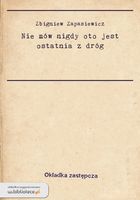
mrok sinego nieba dni pogodę zmógł”.
Przyjdzie dzień ów, wytęskniony z wszystkich dni,
Zadudni światu krok nasz werblem: oto my.
Od kraju palm aż do dalekich śnieżnych pól
jesteśmy, z nami nasza męka i ból,
a gdzie trysnęła kiedyś w ziemię nasza krew,
tam zakwitnie nasze męstwo, bunt i gniew.
Słońce jutra opromieni nasze dziś,
nasze „wczoraj” zniknie z wrogiem jak zła myśl.
Choćby się dla nas słońce nie zdążyło wznieść,
jak hasło poprzez pokolenia pójdzie pieśń.
Ołowiem pieśń ta napisana jest i krwią.
To nie ptak wolny, co swobodę nuci swą.
To naród pośród ścian, kruszących się już w gruz
piosenkę w wargach, a nagany w dłoniach niósł.
Contributed by Riccardo Venturi - 2017/9/1 - 19:16
Czech version by J. Kraus
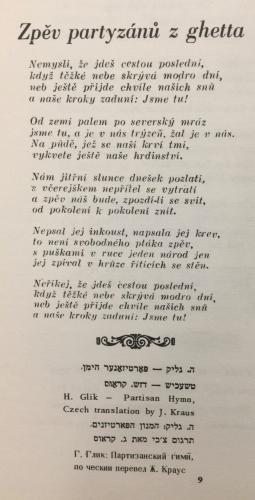
Sul sito di Eli Rabinowitz è presente soltanto l'immagine ripresa dalla brochure di Leizer Ran (1972), con indicazione del traduttore. La abbiamo qui riprodotta testualmente.
Eli Rabinowitz's website includes only an image taken from Leizer Ran's brochure, with the translator's name. We have reproduced it here as a text
Nemysli, že jdeš cestou poslední,
když těžké nebe skrývá modro dní,
neb ještě přijde chvíle našich snů,
a naše kroky zaduní: Jsme tu!
Od zemí palem po severský mraz
jsme tu, a je v nás trýzeň, žal je v nás.
Na půdě, jež se naší krví tmí,
vykvete ještě naše hrdinství.
Nám jitřní slunce dnešek pozlatí,
s včerejškem nepřítel se vytratí,
a zpěv náš bude, zpozdí-li se svit,
od pokolení k pokolení znít.
Nepsal jej inkoust, napsala jej krev,
to není svobodného ptáka zpěv,
s puškami v ruce jeden národ jen
jej zpíval v hrůze řítících se stěn.
Neříkej, že jdeš cestou poslední,
když těžké nebe skrývá modro dní,
neb ještě přijde chvíle našich snů,
a naše kroky zaduní: Jsme tu!
Contributed by Riccardo Venturi - 2017/9/3 - 23:53
Slovak translation
Reproduced from punkgen.sk.
"Napísal litviansky židovský partizán Hirsh Glick, v roku 1943, v tej dobe uväznený vo Vilniuskom ghette. Zúčastnil sa aj na ozbrojenom povstaní v ghette. Pieseň sa stala hymnou židovského odbojového hnutia. Neskôr bol prevezený do koncentračného tábora v Estónsku, odkial utiekol. Odvtedy ho nikto nevidel."
Nikdy nehovor, že tvoja cesta sa končí:
myšlienky zatiahnu oblohu, prekryjú modrý deň.
Hodina, na ktorú sme čakali, je tak blízko;
dupot našich bôt oznámi správu: Sme tu!
Zo zelených krajín paliem, aj z ďalekých krajín snehu,
prichádzame s našimi mukami a smútkom;
Všade, kde naša krv padá na zem, tam je naša odvaha,
a naša duša je večná.
Každé ráno nám slnko vnesie svetlo do nášho dňa,
a trpký včerajšok aj s našim nepriateľom zostane v tme.
Ale niekedy, keď je čas dlhý a slnko nevychádza,
nechaj túto pieseň hrať ďalej, ako spomienku pre ďalšie generácie.
Táto pieseň bola napísaná krvou, nie perom,
nie je to pieseň, akú spievajú v lete vtáci nad nami;
Túto pieseň spievali ľudia medzi padajúcimi domami
s granátmi v ruke, s pohľadmi na svojom cieli.
A tak nikdy nehovor, že tvoja cesta sa končí:
myšlienky zatiahnu oblohu, prekryjú modrý deň.
Hodina, pre ktorú sme hladovali, je tak blízko;
dupot našich bôt znamená jedno - sme tu!
Contributed by Riccardo Venturi - 2017/9/5 - 12:18
Byelorussian [Belarusian] version by Aljaksej Žbanaŭ
The translated lyrics are reproduced from Eli Rabinowitz's website (Section: Words), but we have provided here a transcription according to the principles used in our site. The translator's name is stated in this page.
Хоць хмары шэрыя вісяць над галавой.
Яшчэ ён прыйдзе, наш даўно чаканы час,
І кожны крок – зарок, што ўжо ня знішчыць нас!
Ад краю пальмаў да заснежаных мясцін
Нясем свой боль і сваё гора як адзін.
І дзе ўпадзе крыві хоць кропля з нашых цел,
Узыдзе наша моц і мужнасць узрасце.
Устане сонца й пазалоціць новы дзень.
І знікне ноч, і з ёю вораг прападзе.
Але пакуль трывожна ранішняй парой,
Хай пойдзе песня з хаты ў хату, як пароль.
Яе пісалі не чарнілам, а крывёй.
Гэта не песенька пра птушку над зямлёй.
Калі валіліся муры, забыўшы страх,
Яе спяваў народ са зброяй у руках.
Xoć xmary šeryja visjać nad hałavoj.
Jašče ën pryjdze, naš daŭno čakany čas,
I kožny krok – zarok, što ŭžo nja zniščyć nas!
Ad kraju palmaŭ da zasnežanyx mjascin
Njasem svoj bol i svaë hora jak adzin.
I dze ŭpadze kryvi xoć kroplja z našyx ceł,
Uzydze naša moc i mužnasć uzrasce.
Ustane sonca j pazałocić novy dzeń.
I znikne noč, i z ëju vorah prapadze.
Ale pakul tryvožna ranišnjaj paroj,
Xaj pojdze pesnja z xaty ŭ xatu, jak parol.
Jaje pisali ne čarnilam, a kryvëj.
Heta ne peseńka pra ptušku nad zjamlëj.
Kali valilisja mury, zabyŭšy strax,
Jae spjavaŭ narod sa zbrojaj u rukax.
Contributed by Riccardo Venturi - 2017/9/1 - 20:39
Alemannische Ibersetzig
Zum schreibe vu dem Lied hett de Hirsch de Ghetto Ufstand in Warsaw inspiriirt. De Namme vu dem Lied bedüded »Sog Niimols«, un kommt vu de erschde Zeile vu dem Lied, »Sog niimols du gengsch de letschde Weg no go.«
Sog niimols du gengsch de letschde Weg no go,
au wenn bleiene Wolke blaue Tage bedegge.
Wenn d Stund wo mir druf warde isch so nahe scho
Unser Schritt macht e laude Ton: mir sin do!
Wenn d Stund wo mir druf warde isch so nahe scho
Unser Schritt macht e laude Ton: mir sin do!
Vu grianem Palmeland zu weissem Land voll Schnee.
Mir komme a mit unsrer Pein, mit unsrem Weh,
Un wo gfalle isch e Schbritzerle vu unsrem Bluet,
Schbriasse wird do unsre Kraft, unsre Muet!
Un wo gfalle isch e Schbritzerle vu unsrem Bluet,
Schbriasse wird do unsre Kraft, unsre Muet!
D Morgesonne wird fir üs erhelle s Heut,
un d Nächte werde verschwinde mitm Feind,
Aber wenn s verschloffe dääd d Sonn im Morge -
e Paarol soll geh des Lied vu Diir z Diir.
Aber wenn s verschloffe dääd d Sonn im Morge -
e Paarol soll geh des Lied vu Diir z Diir.
Des Lied wurd gschriibe mit Bluet, un nit mit Blei,
S isch kei Liedle vu nem freie Vogel,
s het a Volk zwische fallende Wänd,
des Lied gsunge mit Naganter in de Händ
s het a Volk zwische fallende Wänd,
des Lied gsunge mit Naganter in de Händ.
Eso sog niimols nit, ass gengsch de letschde Weg,
Au wenn bleiene Wolke blaue Tage bedegge.
Wenn d Stund wo mir druf warde isch so nahe scho
Unser Schritt macht e laude Ton: mir sin do!
Wenn d Stund wo mir druf warde isch so nahe scho
Unser Schritt macht e laude Ton: mir sin do!
Contributed by Riccardo Venturi - 2017/3/11 - 23:30
断じて言うな、これが最後の道だとは
青空が鉛の被いに曇らされても
われら待望の日はまたやってくる
足踏み鳴らせば轟く太鼓、われらここにあり
緑の椰子の国から白い雪の国へ
われらは痛みと悲しみを抱いて来る
そしてわれらの血が滴るとそこで
われらはいっそう力をつけ、意気があがる
朝日がわれらの一日を輝かせるだろう
そして過去は敵とともに消えるだろう
でももし太陽が夜明けに間に合わなくても
この歌は末代まで合言葉として歌い継がれる
この歌は血で書かれている、鉛じゃない
自由気侭な小鳥の歌とは違う
崩壊する壁のあいだにある民の歌
銃を手にして歌う歌だ
断じて言うな、これが最後の道だとは
青空が鉛の被いに曇らされても
われら待望の日はまたやってくる
足踏み鳴らせば轟く太鼓、われらここにあり
Contributed by Riccardo Venturi - 2017/3/12 - 23:04
Finnish version by Arvo Salo, recorded 1981 by Elis and Seela Sella.
Si intitola Älä sano, että viimeinen on tie ("Non dire che è l'ultima strada"). Parole aggiunte da Juha Rämö il 2/4/2017.
This Finnish version goes under the title of Älä sano, että viimeinen on tie ("Don't say it is the last way"). Lyrics added by Juha Rämö on 2/4/2017.
Älä sano, että viimeinen on tie,
lyijyn läpi mutta aurinkoon se vie.
Kyllä koittaa päivä, löytyy määränpää,
marssi kaikuu, torvi raikuu elämää.
Tuolla palmurannat, siellä lumen maa,
tuskat, kärsimykset niissä jäivät taa.
Missä pirskunut on verta uhrien,
sieltä kasvaa uljas voima urheitten.
Lyijy ei vaan veri laulun tehnyt on,
sitä laulanut ei lintu kahleeton.
Sen on tehnyt kansa saartaessa yön,
pyssyt kourissansa alkaessa työn.
Zog nit keynmol az du geyst dem letstn veg, [1]
Khotsh himeln blayene farshteln bloye teg.
Kumen vet nokh undzer oysgebenkte sho -
S'vet a poyk ton undzer trot - mir zaynen do!
Contributed by Riccardo Venturi + Juha Rämö - 2017/3/12 - 23:56
Lithuanian version by Roza Litay
Reproduced from Eli Rabinowitz's website (Section: Words)
Niekad nesakyk kad eini galutinį kelią,
Nors mėlynas dangus uždengia tamsias dienas.
Ateis mūsu išsiilgta valanda –
Plaks mūsų žingsniai: Mes Esame Čia!
Nuo žalių palmų žemės iki žemės balto sniego
Mes ateiname su mūsų sielvartu ir mūsų vargais
Ir kur nukrito lašas mūsų kraujo
Gyvens mūsų narsumas, mūsų drąsa!
Ankstyvo ryto saulė nušvies mūsų dienas,
Ir vakar diena su mūsų priešas išnyks,
Bet jeigu saulė uždels rytuose –
Ši daina kaip slaptažodis turi eiti per kartas.
Ši daina buvo parašyta krauju ir švinu,
Tai ne paukščiuko daina laisvėje,
Tai tremtos tarp sienų tautos daina.
Ši daina buvo dainuojama su ginklais rankose.
Todėl – niekad nesakyk kad eini galutini kelią,
Nors mėlynas dangus uždengia tamsias dienas.
Ateis mūsu išsiilgta valanda –
Plaks mūsų žingsniai: Mes Esame Čia!
Contributed by Riccardo Venturi - 2017/9/1 - 18:38
A word-for-word translation into Afrikaans
Reproduced from Eli Rabinowitz's website (section: "Words"). The translator's name is not stated, but it could be E.R. himself as he is a native from South Africa.
Waar ‘n druppel van ons bloed val, sal ons moed opnuut groei.
Ons triomf sal kom en ons klinkende voetstappe sal verkondig: Ons is hier!
Van die land van die palmbome tot die verre land van sneeu,
Ons sal kom met ons pyniging en ons wee.
En oral het ons bloed in die aarde gesink,
ons dapperheid en krag sal uitbloei!
Ons sal die oggendson hê om ons dae op te knip.
Ons bose joune sal verdwyn met die vyand.
Maar as die tyd lank is voordat die son verskyn,
laat hierdie lied deur die jare soos ‘n sein gaan.
Hierdie liedjie is geskryf met ons bloed en nie met lood nie.
Dit is nie ‘n liedjie wat somervoëls oorhoofse sing nie.
Dit was ‘n volk te midde van brandende barricades
wat die lied van ons sang met pistole en granate gesing.
Sê dus nooit dat jy op jou laaste pad gaan nie.
Alhoewel verduisterde wolke, kan dit nou die blou van die dag verberg.
Want die uur waarvoor ons honger het, is so naby.
Onder ons voete sal die aarde donder: Ons is hier!
Contributed by Riccardo Venturi - 2017/9/4 - 10:24
Virginia Niri - 2005/6/3 - 15:21
Esule in sé
krzyś - 2014/1/26 - 02:14
...
risuonerà ancora il nostro passo "noi siamo qui"
...
e la vita non finirà!
Prof. Pietro Nardella Dellova - 2014/11/12 - 11:37
B.B. - 2016/11/17 - 08:26
Fai caso, Rick, che è lo stesso testo dalla pagina del sito di Eli Rabinowitz che viene seguito però dalla riproduzione della pagina con il testo tradotto da Miriam Gold. Ecco, una piccola svista dei admministratori ebrei, per altro più breve di una strofa.
k - 2017/9/1 - 21:48
Riccardo Venturi - 2017/9/3 - 23:22
adriana - 2018/8/16 - 15:50
Note for non-Italian users: Sorry, though the interface of this website is translated into English, most commentaries and biographies are in Italian and/or in other languages like French, German, Spanish, Russian etc.

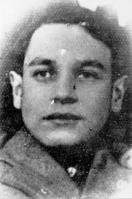





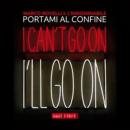
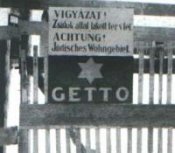
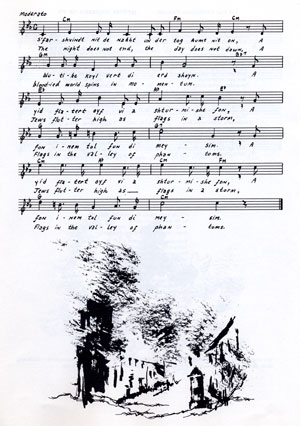
[1943]
Testo di Hirsh Glik
Musica di Dimitri Pokrass
[dalla canzone russa То не тучи — грозовые облака,
o Терская походная, con parole di Aleksej Surkov, 1935]
Lyrics: Hirsh Glik
Music: Dimitri Pokrass
[based upon the Russian song То не тучи — грозовые облака, or Терская походная, lyrics by Aleksej Surkov, 1935]
מלים : הירש גליק
מנגינה: דן ודמיטרי פֿוקאַרס
E' generalmente associata all'insurrezione del ghetto di Varsavia, ma le sue origini sono a Vilnius (Vilna), la rivolta del cui ghetto scoppiò proprio quando arrivarono le notizie da Varsavia. Fu registrata per la prima volta nel 1946 a cura della Commissione Storica Ebraica di Monaco di Baviera. All'inizio della registrazione, Shmerke Kaczerginski introduce la canzone e afferma di aver scritto lui le parole della canzone, cosa assolutamente non vera. Lo stesso Kaczerginski corresse però la sua falsa affermazione nella sua famosa antologia del 1948, pubblicata a New York, Lider fun getos un lagers, non solo attribuendo la canzone al suo vero autore, ma facendole aprire l'intera antologia.
Hirsh Glik (spesso nominato con la grafia tedesca “Hirsch Glick”) era nato a Vilnius il 24 aprile 1922, e aveva cominciato a comporre canzoni in giovanissima età. Da questo sembra essere nata una sorta di leggenda, vale a dire che Glik avesse scritto Zog nit keynmol all'età di 16 anni. Nel 1943, invece, ne aveva ventuno ed era membro attivo e partigiano della FPO (Faraynte Partizaner Organizatsye), l'Organizzazione Partigiana Ebraica che diede inizio alla rivolta del ghetto di Vilnius. Hirsh Glik scomparve l'anno dopo, nel 1944, dopo essere fuggito da un lager estone dove era stato rinchiuso una volta catturato. Fu probabilmente ripreso quasi subito e fucilato dai nazisti.
La canzone divenne in brevissimo tempo l'inno della Resistenza attiva ebraica al nazismo, ma deve essere pienamente ascritta ai più importanti (e noti) canti della Resistenza europea. E' bene a questo punto specificare che esso nacque in un'organizzazione resistenziale, la FPO, che in generale tutto era fuorché sionista (lo stesso Kaczerginski, che ne fu tra i capi, non si stabilì mai in Israele; dopo la guerra visse a lungo a Parigi e poi in Argentina, dove morì nel 1954 in un incidente aereo). In massima parte, i membri della FPO erano comunisti. Nel canto di Glik, “scritto col sangue e non con la matita”, “da un popolo con le pistole in mano”, non esiste certamente alcun riferimento né al sionismo, né a terre promesse. Le "pistole in mano" del canto sono le Nagan, vale a dire le Nagant M1895, che erano le pistole dell'Armata Rossa. Già nel 1945 fu tradotto in lingua ebraica dal poeta Avraham Shlonsky, e già in questa traduzione (pur oggettivamente bella) si avverte un dato "passaggio": il suo uso come “simbolo dell'Olocausto” e l'uso che ne viene fatto in Israele e in tutto il sionismo può essere definito tranquillamente una mistificazione, oltre che un'inesattezza storica; ma è un caso fin troppo comune.
Ci piacerebbe, in questa pagina, ristabilire almeno un minimo di esattezza e di obiettività rispetto a questo famosissimo canto. In Zog nit keynmol non c'è in realtà nulla di specificamente “ebraico”, a parte un riferimento ad una provenienza storica (la “Terra delle verdi palme”), né tantomeno “sionista”. Il suo posto dovrebbe essere accanto ai grandi canti della Resistenza europea, non come una sorta di secondo inno israeliano accanto a Hatikvà. Non parla di “Olocausto”, ma di rivolta armata e di speranza nel momento più buio. Si potrebbe persino arrivare a dire, senza che sia affatto una bestemmia, che se è nato dalla rivolta di ghetti sta molto meglio nei ghetti di oggi, che nella propaganda planetaria sionista. Sta molto meglio a Gaza che in bocca agli oppressori di oggi. Sta molto meglio in bocca a chiunque abbia lottato e lotti non a parole contro uno spietato oppressore, che a chiunque opprima spietatamente. [RV]
The song was recorded for the Jewish Historical Commission, Munich, 1946. At the opening, Shmerke Kaczerginski introduces the song, and says that he wrote its words. This is untrue.
The song is performed by Betty Segal, accompanied by Akiva Daykhes.
The song was published many times. It is the opening song in Kaczerginski’s anthology Lider fun Getos un Lagers (1948: words – p. 3, melody p. 361). The title of the anthology Mir Zaynen Do (1983: p. 94) is taken from the song’s refrain. The song appears with Hebrew translation by the poet Abraham Shlonsky (who translated it in 1945), in Min Hametsar Karati (1954: p. 189, text only), in the anthology Min Hametsar (1987, p. 98, with the melody), and in other collections. In Leyzer Ran’s booklet celebrating Hirsh Glik’s 50th anniversary, The Hymn of the Jewish Uprising (New York, 1972), the song is elucidated and translated into many languages.
The Hymn of the Partisans was written by Hirsh Glik for the Vilna Jewish United Partisan Organization (FPO), and became the hymn of the Jewish uprising. The hymn was sung in the Vilna ghetto and among the Vilna partisans, spreading to the labor camps, concentration camps and other partisan groups. The song later became the hymn for Holocaust Day remembrance ceremonies in Israel and abroad.
The song encourages and praises heroism and uprising. It is a testimony to Jewish suffering and sacrifice for the sake of liberty, and is intended to be sung from generation to generation.
The melody is taken from a song written for the 1937 hit film Sons of the Working People. It has a march-like, dotted rhythm, suitable for this kind of communal song. - Heartstrings - Music of the Holocaust - Yad Vashem
QUICK INDEX OF VERSIONS AVAILABLE (In 23 languages up to now)
Ebraico (Avraham Shlonsky) – Ebraico (versione traslitterata e traduzione italiana) – Italiano 1 – Italiano 2 (Archivi Storici del Piemonte) – Italiano 3 (Rocco Rosignoli) – Italiano 4 (Ararat Ensemble Orchestra) - Italiano 5 (Pardo Fornaciari - Riccardo Venturi) - Livornese (Riccardo Venturi) - Inglese 1 (Paul Robeson) – Inglese 2 (Aaron Kremer) – Inglese 3 – Inglese 4 – Francese 1 (Charles Dobzynski) – Francese 2 (Irene Kanfer) - Francese 3 – Tedesco 1 (“Kuba”) - Tedesco 2 (Heinz Kahlau) - Tedesco 3 (Hubert Witt) - Tedesco 4 - Spagnolo 1 (Emilio David Abraham Ofengenden) – Spagnolo 2 (S.Nudelshtecher) - Portoghese (Pietro Nardella Dellova) – Romeno ("E.D.") - Greco (Riccardo Venturi) - Neerlandese 1 (Luc Wynants) – Neerlandese 2 (I. Fuchs) - Svedese (Lennart Kerbel) - Norvegese Nynorsk 1 (Olve Utne) – Norvegese Nynorsk 2 (Erling Outzen - Russo 1 (Perec Davidovič Markiš) – Russo 2 (Leon Feinberg) - Polacco 1 (Miriam Gold) – Polacco 2 (Mateusz Trzeciak) – Polacco 3 (letta da Zbigniew Zapasiewicz) - Ceco (J. Kraus) - Slovacco - Bielorusso (Aljaksej Žbanaŭ) - Alemannico (Schwyzertüütsch) - Giapponese - Finlandese (Arvo Salo) - Lituano (Roza Litay) - Afrikaans
Hebrew (Avraham Shlonsky) – Hebrew (transcription and Italian translation) – Italian 1 – Italian 2 (Archivi Storici del Piemonte) – Italian 3 (Rocco Rosignoli) – Italian 4 (Ararat Ensemble Orchestra) - Italian 5 (Pardo Fornaciari - Riccardo Venturi) - Livornese (Riccardo Venturi) - English 1 (Paul Robeson) – English 2 (Aaron Kremer) – English 3 – English 4 – French 1 (Charles Dobzynski – French 2 (Irene Kanfer) - French 3 – German 1(“Kuba”) - German 2 (Heinz Kahlau) - German 3 (Hubert Witt) - German 4 - Spanish 1 (Emilio David Abraham Ofengenden) – Spanish 2 (S.Nudelshtecher) - Portuguese (Pietro Nardella Dellova) – Romanian ("E.D.") - Greek (Riccardo Venturi) - Dutch 1 (Luc Wynants) – Dutch 2 (I. Fuchs) - Swedish (Lennart Kerbel) - Norwegian Nynorsk 1 (Olve Utne) – Norwegian Nynorsk 2 (Erling Outzen) - Russian 1 (Perec Davidovič Markiš) – Russian 2 (Leon Feinberg) - Polish 1 (Miriam Gold) – Polish 2 (Mateusz Trzeciak) – Polish 3 (read by Zbigniew Zapasiewicz) - Czech (J. Kraus) - Slovak -
Byelorussian (Aljaksej Žbanaŭ) -Alemannic (Swiss German) - Japanese - Finnish (Arvo Salo) - Lithuanian (Roza Litay) - Afrikaans
Eli Rabinowitz's website on "Zog Nit Keynmol" including reference, images, words and direct links to Antiwarsongs. Special thanks to Eli Rabinowitz for this authentical website twinning. [CCG/AWS Staff]
ZOG NIT KEYNMOL Poem by Hirsh Glik 1943
With words by Hirsh Glik and music by Dmitri and Daniel Pokrass, “Zog Nit Keynmol” became the anthem of the Jewish underground resistance movement in World War II. Hirsh Glik’s lyrics were combined with a march melody from the 1938 Soviet film Son of the Working People to create the inspiring song “Zog Nit Keynmol.” Following the end of World War II “Zog Nit Keynmol” has frequently been sung at Holocaust commemorations worldwide, particularly on Yom Hashoah.
The words to “Zog Nit Keynmol” reflect the author’s strong belief in Jewish armed resistance to Nazi oppression. Like many other partisan songs, “Zog Nit Keynmol” served to reinforce Jewish identity and maintain camaraderie in an environment where heroism was required and death was commonplace. Refusing to admit defeat or accept the possibility that Jewish life in Europe was doomed, the song’s lyrics are defiant and optimistic.
Knowing that Jewish communities in Eastern Europe were being destroyed all around them, Jewish partisans employed armed resistance to oppose Nazism. Glik’s lyrics to “Zog Nit Keynmol” helped to sustain the partisans as they risked their lives while forging another link in the long tradition of Jewish poetry dedicated to maintaining unity against hostile outside forces.
William R. Ferneke